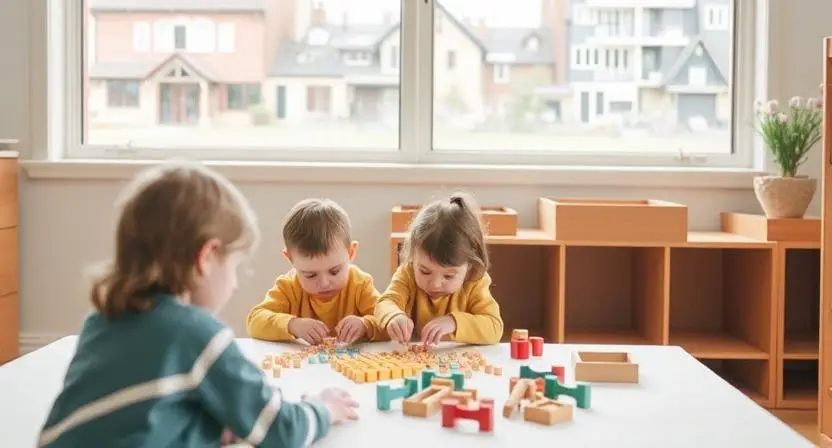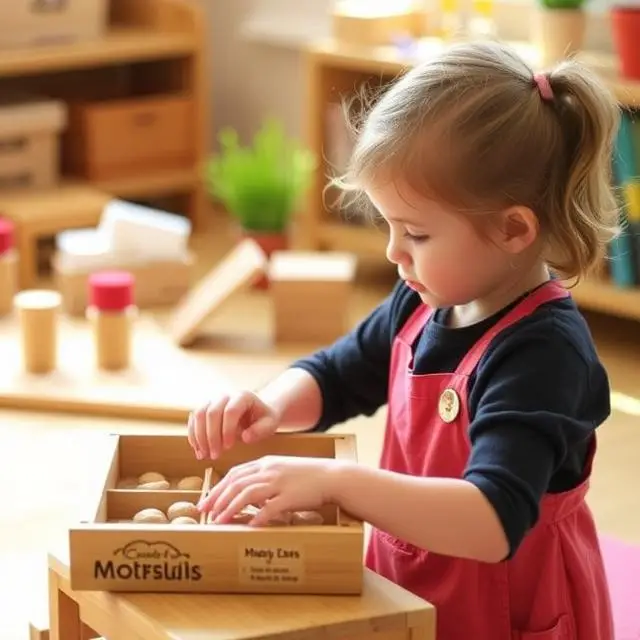Montessori education is a widely praised approach that emphasizes independence, hands-on learning, and a child-centered environment. While it has its advantages, such as fostering self-reliance and creativity, there are notable drawbacks to the Montessori system that may not be suitable for every child or family. In this article, we’ll explore the cons of Montessori education and how they can affect children, parents, and the broader educational landscape. Whether you’re debating between Montessori and traditional schooling or simply looking for more insight, understanding these potential disadvantages will help you make an informed decision.
Lack of Structure and Routine
Potential Challenges for Children Who Thrive on Consistency
One of the primary criticisms of Montessori education is its flexibility, which can sometimes be overwhelming for children who thrive in structured environments. The Montessori method is designed to allow children to have a say in how they spend their time, which can be a challenge for those who rely on routine and predictability. Children who need clear guidance and structure may feel anxious or uncomfortable in a setting where they have to make their own choices throughout the day.
Difficulty Adapting to Traditional Schools Later
Another significant drawback is that children raised in a Montessori environment may struggle when transitioning to a more traditional school system. Traditional schools tend to have more rigid schedules, prescribed lessons, and teacher-directed instruction, which can be a stark contrast to the autonomy experienced in Montessori settings. The shift to a traditional classroom can be jarring for students used to managing their own learning pace and activities.
Some Children May Feel Overwhelmed by Too Much Freedom
While independence is a core principle of Montessori education, some children may find the freedom overwhelming. Without clear expectations or a structured framework, these children might not know how to navigate the day effectively. This lack of guidance may lead to frustration or a sense of insecurity, affecting their overall educational experience.
Limited Focus on Traditional Academic Rigor
Less Direct Instruction in Core Subjects
Montessori education tends to emphasize exploration, self-learning, and discovery over direct instruction. As a result, core subjects like math, reading, and writing may not receive the same level of emphasis as they would in traditional academic settings. In Montessori schools, students are encouraged to explore these subjects at their own pace, which might not provide the same depth of understanding as the structured, curriculum-driven approach found in traditional classrooms.
Math and Literacy May Progress Differently
In Montessori schools, there is often less formal teaching of foundational subjects such as math and literacy. While this approach encourages individual exploration, some children may struggle without clear guidelines or explicit instruction. For example, children may advance in math and reading at different rates compared to their peers in traditional schools, which can cause feelings of confusion or frustration. In some cases, children may fall behind in these areas without the guidance of a teacher leading the lesson.
Not Ideal for Children Who Need Clear Guidance
Montessori education might not be the best fit for children who require explicit direction. These children may find it difficult to work independently without teacher-led instruction. For example, a student who needs clear steps to understand a math concept may struggle in a Montessori environment, where the focus is on individual exploration rather than direct teaching.
Fewer Opportunities for Competitive Learning
In Montessori schools, the absence of grading, tests, and comparisons to peers means that competitive learning is often not a focus. For some children, this can be a disadvantage, especially if they thrive in environments that challenge them to outperform others. The lack of academic competition in Montessori schools may leave children unprepared for high-pressure academic environments that they will face in future educational settings.
Lack of Grades Can Reduce Motivation for Some Students
In Montessori classrooms, students are generally not graded, and the focus is placed on intrinsic motivation. While this system works well for some children, others may struggle without external validation. For these students, the absence of grades can lead to a lack of motivation or a sense of directionless learning. Without the incentive of grades, children may not feel compelled to perform at their best, which could affect their academic progress.
Social and Behavioral Concerns
Mixed-Age Classrooms Can Create Challenges
Montessori classrooms are often mixed-age, meaning that children of different age groups learn together. While this model encourages mentorship and collaboration, it can also present social challenges. Older children may dominate activities or decision-making, which could hinder younger students from having their voices heard. Conversely, younger children might struggle to keep up with their older peers or feel excluded from group tasks.
Older Children May Dominate Activities
In mixed-age classrooms, older students often take on leadership roles, which can unintentionally overshadow younger children. While this can create opportunities for older children to develop leadership skills, younger children may feel excluded or struggle to assert themselves in group settings. This imbalance may affect their social development and confidence.
Younger Kids Might Feel Left Behind
Younger children in Montessori schools might also face challenges as they observe their older peers excelling in tasks that they are not yet capable of doing. This could potentially lead to feelings of inadequacy or frustration, which may hinder their academic and social growth.
Limited Emphasis on Discipline and Rules
In some Montessori schools, the focus is on fostering self-discipline and personal responsibility rather than enforcing strict behavioral rules. While this approach can help some children become more self-regulated, others may find it difficult to adapt to the lack of external structure. The absence of clearly defined rules and consequences may lead to issues with classroom behavior, especially in children who need more guidance or who are prone to distractions.
Some Children May Develop Poor Classroom Habits
Without a focus on discipline or structured routines, some children may develop habits that are not conducive to success in traditional school settings. For example, children may struggle with completing tasks on time, following instructions, or staying focused in a structured environment. This lack of discipline can hinder their overall academic and behavioral development.
Parents May Struggle with Behavioral Expectations at Home
In Montessori schools, the emphasis is on nurturing self-control and independence, but this can sometimes create a disconnect between home and school expectations. Parents may struggle with reinforcing the same behaviors at home, especially if they are not fully aligned with the Montessori method. For example, parents may find it difficult to manage behavior if their child is used to more freedom and less supervision at school.

Accessibility and Practical Issues
High Cost and Limited Availability
Montessori education, while highly regarded, is not always accessible due to its high cost and limited availability. Montessori schools often require higher tuition fees compared to traditional public schools, making them financially out of reach for many families. Additionally, Montessori schools are not as widespread as traditional schools, meaning that they may not be available in certain areas, leaving families with limited options.
Montessori Schools Are Often Expensive
The cost of tuition at Montessori schools can be prohibitive, especially for families with limited financial resources. While some private schools offer scholarships or financial aid, the overall cost remains a significant barrier for many parents. This can be especially problematic for families who value the Montessori method but cannot afford the associated fees.
Not Widely Available in All Regions
Montessori schools are not as widespread as traditional public or private schools, and their availability can be limited to specific regions. In areas where Montessori schools are scarce, parents may have to travel long distances to access one, further complicating the decision for families considering this type of education.
Parental Involvement Can Be Demanding
Montessori education often requires high levels of parental involvement, as parents are expected to reinforce the values and learning methods at home. This can be challenging for families with busy schedules or those who may not have the time or resources to actively participate in their child’s learning process. For working parents or those with other commitments, the level of involvement required can be overwhelming.
Requires Parents to Reinforce Learning at Home
In Montessori schools, much of the learning occurs through self-directed activities, meaning parents play a key role in continuing the educational process at home. This added responsibility may not be ideal for families with limited time or resources, potentially putting undue pressure on parents to stay involved in their child’s education.
Not Ideal for Families with Limited Time
For families who already juggle multiple commitments, the time and energy required for reinforcing Montessori principles at home may be a significant burden. The approach can place extra strain on parents who may struggle to balance their work and family life while still providing the necessary support for their child’s education.
Conclusion: Weighing the Pros and Cons of Montessori Education
Montessori education offers a unique approach to learning, one that encourages independence, creativity, and self-discovery. However, it’s not without its challenges. The lack of structure, limited focus on traditional academic rigor, potential social concerns, and practical issues like cost and availability may make it unsuitable for every child or family. When choosing between Montessori and traditional schooling, it’s important to carefully consider your child’s needs, learning style, and family situation. By understanding both the pros and cons, you can make a more informed decision that best supports your child’s educational journey.

